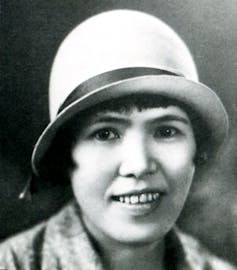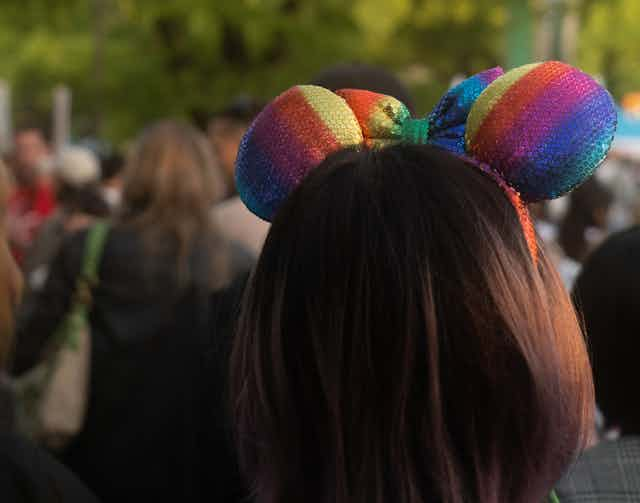Japan has passed legislation aimed at “promoting the understanding” of members of the LGBTQ community – a watered-down bill that will do little to put the Asian country in line with fellow liberal democracies on the issue.
As many reports of the bill’s passage on June 16, 2023, have noted, Japan lags far behind other G7 countries when it comes to the legal protection of sexual minorities.
There has been less discussion of how the limits of the new law – and the prolonged battle to get it passed – highlight how national politicians are out of step with Japanese society at large.
Despite Japan’s international stereotype as a socially conservative nation – a view swayed by the political leanings of the national government – both corporate Japan and regional authorities in the country have long been out in front of parliament on the rights of LGBTQ people. Moreover, Japan’s history on same-sex relationships is decidedly more mixed than many in the country’s national politics, or in the West, would acknowledge.
Changes in society, courts and corporate Japan
The bill passed by both houses of Japan’s parliament does little to move the needle for the rights of sexual minorities in the country. There are no additional legal protections included. And a vague stipulation in the bill that “all citizens can live with peace of mind” has been criticized by LGBTQ activists for de-prioritizing the rights of sexual minorities.
The fact that even such modest proposals faced a battle to be passed is indicative of the stubbornness of the national parliament to seriously address LGBTQ rights.
Yet outside the national parliament, the political and legal struggles for equal rights for sexual minorities have achieved a series of successes in recent years in Japan, especially at the regional and municipal levels.
In March 2019, legislation banning discrimination against sexual minorities was passed in Ibaraki prefecture. A month later, a Tokyo Metropolitan Assembly law prohibited all discrimination on the basis of sexual orientation and gender identity. The Tokyo law also committed the city government to raising awareness of LGBTQ people and outlawed the expression of hateful anti-LGBTQ rhetoric in public.
Polling in February 2023 found that 64.3% of Japanese respondents backed laws that promoted a better understanding of sexual minorities. A similar percentage of the population also support the legal recognition of same-sex marriage.
And on the issue of same-sex marriage, it is again at the local level where strides are being made.
Several district courts have now ruled that the Japan’s ban on same-sex marriage violates Article 14 of its constitution, which guarantees equality of all people before the law.
Pushback at national level
Yet the conservative Liberal Democratic Party government of Prime Minister Fumio Kishida disagrees, pointing to Article 24 of the Constitution, which states that marriage is based only on “the mutual consent of both sexes and it shall be maintained through mutual cooperation with the equal rights of husband and wife.”
In the absence of a national law to overturn the ban on same-sex marriage, local authorities have turned to civil partnerships. Although these do not provide legal protection against discrimination more broadly, they do offer some benefits, including the option to apply for public housing.
More than 300 municipalities – representing around two-thirds of the population – already allow same-sex couples to enter partnership agreements which are recognized at the local level.
Some temples have begun to offer same-sex wedding ceremonies. While Shinto, Japan’s ancient and influential religious tradition, is perceived to be staunchly conservative, at least one Shinto sect has expressed support of the LGTBQ community.
Picking up on both public sentiment and evolving regional policies, an increasing number of corporations in Japan have begun to recognize sexual minorities as an important segment of both their staff and customers.
In 2019, a total of 200 Japanese corporations established guidelines which prohibit discrimination based on sexual orientation and sexual identity and extend customary benefits for marriage, childbirth and other life-changing events to same-sex couples.
Long-standing queer culture
The resistance of national politicians to establish legal protections for sexual minorities is also out of step with Japan’s long and widely acknowledged history of diverse sexual cultures.
From the Middle Ages to the end of the 19th century, an elaborate male-male sexual culture could be found among the country’s warrior class, Buddhist monks, and in the theater and entertainment world.
Warriors typically married and had children, but they also thought nothing of demanding complete devotion from their male underlings, often including sexual favors and even romance. A variant of such male-male sexual relations could also be found in Buddhist monasteries, where it was couched in spiritual terms.
This male-male sexuality did not amount to an identity; it was simply a facet of the loyalty expected from boys, desired by their masters but having little agency of their own.
Such relations were famously explored in Ihara Saikaku’s “Great Mirror of Male Love,” a collection of 40 same-sex stories published in the 17th century. The collection remained a point of reference for several generations of men: those who maintained these practices, those who strove to curtail the mainstreaming of them, and the scholars keen on studying both.

Meanwhile, the push for same-sex marriage predates that of many of the liberal democracies in which it is now established. In 1925, the Japanese writer Yoshiya Nobuko first pursued a traditional marriage with another woman and the legalization of such unions. Yoshiya was unsuccessful, but instead adopted her partner so that she’d be a legal member of her household.
At that point, same-sex sexuality had become the object of medical diagnosis and “treatment.” But same-sex acts were only subjected to a ban for a short period, from 1872 to 1880.
‘Press on till Japan changes’
Similar to the U.S., the LGBTQ movement in Japan has gained momentum over the last half century.
In the 1980s, the HIV/AIDS crisis instigated major strides in activism. Newly founded LGBTQ organizations in Japan worked to reframe how people thought about sexual minority rights, emphasizing that they were human rights. In 1997, one such group, OCCUR, won its first high-profile case, resulting in the end of restrictions on gay individuals’ presence at a youth hostel in Tokyo.
In the wake of that landmark case, OCCUR also successfully prompted the Japanese Society of Psychiatry and Neurology to drop “homosexuality” from its diagnostic manual and instead acknowledge that homosexuality is not a perversion, sexual orientation is not a disorder, and homosexuals do not simply “perform the opposite role of one’s sex.”
OCCUR was also the driving force behind the first Tokyo Gay and Lesbian Pride Parade, in 1994, which advocated acceptance with slogans such as “Japan with a big heart.”
This year, the Tokyo Rainbow Pride event – Asia’s largest Pride event – returned to full capacity for the first time in four years, after pandemic disruptions.
Its theme is “Press on Till Japan Changes.” Society already is – the question is will the national government follow.

